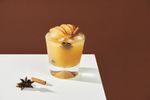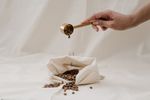If a booze-free month sounds daunting, look to these expert-approved tips for Dry January to make things easier.
The winter months are a wonderful time to celebrate the holidays with family and friends, but these festive get-togethers may have you imbibing more than usual. While no one loves a hangover (or the hangxiety that often accompanies a night of drinking), what's more insidious is that alcohol can wreak havoc on the digestive system. It increases inflammation in the gut, GI tract and liver which can, in turn, set off a bevy of other health issues.
If you're in need of a break from alcohol, consider participating in Dry January. Started in 2013 by the U.K. non-profit Alcohol for Change, this month long challenge to nix alcohol has garnered a huge following.
If the idea of total sobriety — even just for a few weeks — feels arduous, these pointers will bolster your resolve.
6 Tips for Dry January
1. Sip a Booze-Free Drink
Just the act of holding and sipping a drink at the end of a long day can feel relaxing. That moment is what Kimball calls the “witching hour, the transition from the go-go-go hustle to relaxing at night.” But what you're really craving may just be the ritual associated with unwinding.
For many people, a drink may be what marks the end of the work day and a shift into personal-life mode, says Kimball.
Enter: the mocktail. “People are getting really creative and coming up with beautiful, tasty drinks that are zero-proof,” Kimball says. In fact, according to both Yelp's top food and beverage trends of 2023 and Google Trends for 2022, mocktails and non-alcoholic drink recipes are creating a lot of buzz.
The drink market has responded with options — from booze-free beer to not-so-stiff spirits, and turning to one may be a way to maintain your witching hour (or even happy hour) tradition without the alcohol.
RELATED: Winter Mocktail Recipes
2. Find New Modes of Decompression
If zero-proof drinks leave you wanting a taste of an alcoholic one, identify a replacement behavior to help you relax.
Activities that occupy your hands are particularly helpful, as they make it logistically harder to drink, says Hilary Sheinbaum, author of The Dry Challenge: How to Lose the Booze for Dry January, Sober October, and Any Other Alcohol-Free Month.
Plus, a recent survey discovered crafting activities — think knitting, sewing, baking or drawing — helped increase feelings of calmness, alertness, and contentment. Researchers even found that just 45 minutes of art making can lower cortisol levels.
If crafting isn't your thing, working out is a great replacement behavior to turn to. “Exercise alone is a stress reliever; it helps burn off negative energy — and lower elevated heart rates, anxiety and cortisol levels by giving your body an outlet for stress reactions,” says Sheinbaum.
So rather than sitting down on the couch with your drink, meet up with a friend for a walk and talk, roll out the yoga mat or start that sourdough loaf. “Creating new routines can help you avoid drinking while also expanding your breadth of activities,” Sheinbaum adds. “You might even find something new you love to do in the process.”
3. Curb Sugar Consumption
Don't let this suggestion scare you off. It might sound like it'll make the month even harder, but Kimball says anyone going alcohol-free should double-down and nix added sugar from their diets as well — you'll thank us later!
Many people experience increased sugar cravings because the physiological reaction we have when we eat sugar is a similar self-soothing mechanism to how we use alcohol, Kimball explains. The problem is, people tend to replace alcohol with food that is just as addictive — swapping one vice for another.
RELATED: Sneaky Ways Sugar Hooks You
Plus, diving into the dessert tray instead of the bar cart thwarts the results you want when abstaining from booze. “You need to be able to gauge your true response, not a blunted affect from trading an alcohol hangover for a sugar one.”
To make it easier, Kimball says it’s best to eat something every three to four hours that has balanced sources of protein and fat to keep your blood sugar steady. Also, stay hydrated, move your body when you can and get enough sleep — all things we know can help avoid the roller coaster of blood sugar spike and crashes.
RELATED: How Much Water Should You Actually Drink Per Day?
4. Enlist a Support Squad
As with most things in life, Dry January is easier when you have support — something Sheinbaum says is key. Whether you enlist your friends to join along in the challenge or not, you want to have "people who understand in real time how frustrated you feel passing by the wine store and not going in after a particularly tough day," explains Sheinbaum.
Besides, some studies have shown that committing to your goals publicly and having accountability partners can increase your chance of success. Not only that, but connection is an integral part of our sense of belonging and can, in itself, reduce stress levels.
5. Place a Wager
Betting has a well-deserved bad reputation, but wagering that you’ll be successful at a challenge is a tried-and-true tactic. “Making a bet holds you accountable for your actions,” says Sheinbaum. “If you slip up, you know there’ll be consequences in addition to letting yourself down.”
Once you have your support squad on board for the challenge, one way to make it extra juicy is to ask everyone to chip in a certain amount of money — Sheinbaum says anything from a $100 to $1,000 grand prize tends to make people more likely to commit — and those who stick to the challenge can split the pot. (If your squad only consists of two people, you can also wager a nice dinner, massage or even a chore, like mowing the lawn).
Another idea: Set a reward that you only get at the end of the challenge if you succeed. That could be a new tech toy, a winter coat you’ve been eyeing, or a cozy staycation where you actually power down your computer. “With a potential reward at the end of the month, you may be more motivated to see it through because you’ll have something to look forward to on February 1,” says Sheinbaum. Plus, you won’t be spending money on booze throughout your sober month, so you can opt to spend that cash on something else.
6. Fill Up Your Calendar
Last up in our tips for Dry January: Fill your calendar with (alcohol-free) fun! From dinner with friends to birthday parties, concerts, vacations and more, alcohol seems to pop up in most social situations — but don't fret. Rather than seeing this as a detriment to your social calendar, Sheinbaum says to think of it as more of a shakeup. “There are a ton of activities that people of all ages and interests can do together without getting buzzed,” she says.
As you plan social get-togethers, keep that booze-free momentum going. Instead of meeting at the bar, organize a game night or a day at the park. Rather than attending happy hour, try recruiting friends for a workout class.
“When you aren’t drinking with friends, you can be more present in the activity and conversation, and can listen carefully to their thoughts and feelings without a filter making things fuzzy,” Sheinbaum says. “You can have clearer communication without the possibility of misunderstandings related to slurred speech and other distractions."




